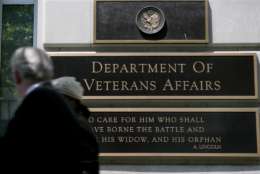IT Modernization
-
The Defense Information Systems Agency’s Enterprise Services Directorate wants to improve customer experience, and find ways to measure their success in order to quantify their improvement.
October 18, 2022 -
The General Services Administration says 20 CFO Act, 11 large or medium and 51 small agencies have until May 31, 2024, to complete the transition to EIS.
October 14, 2022 -
In an exclusive interview with Federal News Network, Danielle Metz, the new CIO for the Office of the Secretary of Defense outlines a plan to dig 18,000 Pentagon employees out of a decade of technical debt.
October 14, 2022 -
The VA is also sending letters to every veteran who may have been impacted by problems with the EHR currently running at five VA locations across the U.S.
October 13, 2022 -
Several agencies, looking to address a long-term cyber workforce shortage in the federal government, are proposing a new pay model to attract these in-demand workers to public service.
October 12, 2022 -
The Army's updated cloud plan adds urgency for commands to move their legacy systems to the cloud, with more cuts planned to government data centers. Hundreds of other systems deemed to have low business value will be sunset entirely.
October 12, 2022 -
The biggest-yet phase of the bring-your-own-device pilot will help the Army figure out how to scale the technology across a diverse population of users in the active and reserve components — and part of the Air Force too.
October 07, 2022 -
With three new awards to OPM, HUD and the Army, the TMF Board now has "loaned" out $435M out of the $1B it received in the 2021 American Rescue Plan Act.
October 06, 2022 -
TSA Administrator David Pekoske thinks common data standards will help his agency more quickly adopt new security screening tech.
October 06, 2022 -
NOAA wants to upgrade its ability to analyze water resources, and it's asking for help from the information technology industry.
October 06, 2022 -
The State Department, once a relative stranger to telework for most functions prior to the COVID-19 pandemic, is taking steps to allow Foreign Service candidates to participate in some assessments virtually.
October 04, 2022 -
The Department of Veterans Affairs is saying it's too soon to know if a vendor update has resolved patient safety issues holding up future rollouts of its new Electronic Health Record.
September 28, 2022 -
The Department of Navy’s CIO’s office spent a year writing the Capstone Design Concept for Information Superiority to make architecture easier to understand and use.
September 27, 2022 -
CIO Guy Cavallo and deputy CIO Melvin Brown are bringing the lessons they learned from the Small Business Administration to change OPM’s culture, modernize its technology and address long-standing workforce issues.
September 23, 2022 -
Deputy VA Secretary Donald Remy told members of the Senate Appropriations Committee that the agency won’t proceed with future EHR go-lives until it addresses persistent outages and patient safety concerns.
September 21, 2022












